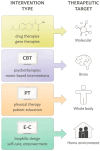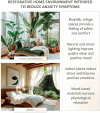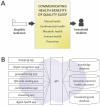Home Environment as a Therapeutic Target for Prevention and Treatment of Chronic Diseases: Delivering Restorative Living Spaces, Patient Education and Self-Care by Bridging Biophilic Design, E-Commerce and Digital Health Technologies
- PMID: 40003451
- PMCID: PMC11855921
- DOI: 10.3390/ijerph22020225
Home Environment as a Therapeutic Target for Prevention and Treatment of Chronic Diseases: Delivering Restorative Living Spaces, Patient Education and Self-Care by Bridging Biophilic Design, E-Commerce and Digital Health Technologies
Abstract
A high prevalence of chronic diseases exposes diverse healthcare pain points due to the limited effectiveness of pharmaceutical drugs and biologics, sedentary lifestyles, insufficient health literacy, chronic stress, unsatisfactory patient experience, environmental pollution and competition with commercial determinants of health. To improve patient care and long-term outcomes, the impact of the home environment is overlooked and underutilized by healthcare. This cross-disciplinary work describes perspectives on (1) the home environment as a therapeutic target for the prevention and treatment of chronic diseases and (2) transforming health-centric household goods e-commerce platforms into digital health interventions. We provide a rationale for creating therapeutic home environments grounded in biophilic design (multisensory, environmental enrichment) and supporting physical activities, quality sleep, nutrition, music, stress reduction, self-efficacy, social support and health education, hence providing clinical benefits through the modulation of the autonomic nervous system, neuroplasticity and behavior change. These pleiotropic "active non-pharmacological ingredients" can be personalized for people living with depression, anxiety, migraine, chronic pain, cancer, cardiovascular and other conditions. We discuss prospects for integrating e-commerce with digital health platforms to create "therapeutic home environment" interventions delivered through digital therapeutics and their combinations with prescription drugs. This multimodal approach can enhance patient engagement while bridging consumer spending with healthcare outcomes.
Keywords: AI; PDURS; biophilia; built environment; health at home; home care; hospital at home; lifestyle medicine; mHealth; self-management.
Conflict of interest statement
GB is a founder and owner of OMNI Self-care, LLC, a health promotion and consulting company supporting evidence-based self-care solutions. OMNI Self-care has a contract agreement with Dayhouse Studio to provide research-based information related to health-focused interior design and related activities, including Dayhouse Living magazine and Dayhouse Marketplace e-commerce. GB is a co-inventor on two issued US patents 9,569,562 and 9,747,423 “Disease Therapy Game Technology” and patent-pending application “Multimodal Platform for Treating Epilepsy”. These patents are related to digital health technologies, and are owned by the University of Utah. DH is the founder and owner of Dayhouse Studio, a health-centric biophilic interior design firm, and the Dayhouse Living magazine. GB and DH are co-inventors on a patent application “System and method for improving therapeutic interventions using household goods e-commerce platform”. Some aspects of the patent-pending technology are described in this article.
Figures







Similar articles
-
Healthy Dwelling: Design of Biophilic Interior Environments Fostering Self-Care Practices for People Living with Migraines, Chronic Pain, and Depression.Int J Environ Res Public Health. 2022 Feb 16;19(4):2248. doi: 10.3390/ijerph19042248. Int J Environ Res Public Health. 2022. PMID: 35206441 Free PMC article.
-
Health education via "empowerment" digital marketing of consumer products and services: Promoting therapeutic benefits of self-care for depression and chronic pain.Front Public Health. 2023 Jan 10;10:949518. doi: 10.3389/fpubh.2022.949518. eCollection 2022. Front Public Health. 2023. PMID: 36703812 Free PMC article.
-
From Precision Metapharmacology to Patient Empowerment: Delivery of Self-Care Practices for Epilepsy, Pain, Depression and Cancer Using Digital Health Technologies.Front Pharmacol. 2021 Apr 23;12:612602. doi: 10.3389/fphar.2021.612602. eCollection 2021. Front Pharmacol. 2021. PMID: 33972825 Free PMC article.
-
Benchmarking the clinical outcomes of Healthentia SaMD in chronic disease management: a systematic literature review comparison.Front Public Health. 2024 Dec 24;12:1488687. doi: 10.3389/fpubh.2024.1488687. eCollection 2024. Front Public Health. 2024. PMID: 39776481 Free PMC article.
-
Digital technology for delivering and monitoring exercise programs for people with cystic fibrosis.Cochrane Database Syst Rev. 2023 Jun 9;6(6):CD014605. doi: 10.1002/14651858.CD014605.pub2. Cochrane Database Syst Rev. 2023. PMID: 37294546 Free PMC article. Review.
Cited by
-
Biophilic design, neuroarchitecture and therapeutic home environments: harnessing medicinal properties of intentionally-designed spaces to enhance digital health outcomes.Front Med (Lausanne). 2025 Jul 10;12:1610259. doi: 10.3389/fmed.2025.1610259. eCollection 2025. Front Med (Lausanne). 2025. PMID: 40708654 Free PMC article.
-
A digitally enabled home-based wound care program using the PEDALs model: a mixed-methods study protocol.Front Public Health. 2025 Jun 6;13:1591187. doi: 10.3389/fpubh.2025.1591187. eCollection 2025. Front Public Health. 2025. PMID: 40547473 Free PMC article.
References
-
- Lee B., Wang Y., Carlson S.A., Greenlund K.J., Lu H., Liu Y., Croft J.B., Eke P.I., Town M., Thomas C.W. National, State-Level, and County-Level Prevalence Estimates of Adults Aged ≥ 18 Years Self-Reporting a Lifetime Diagnosis of Depression—United States, 2020. MMWR Morb. Mortal. Wkly. Rep. 2023;72:644–650. doi: 10.15585/mmwr.mm7224a1. - DOI - PMC - PubMed
MeSH terms
LinkOut - more resources
Full Text Sources

